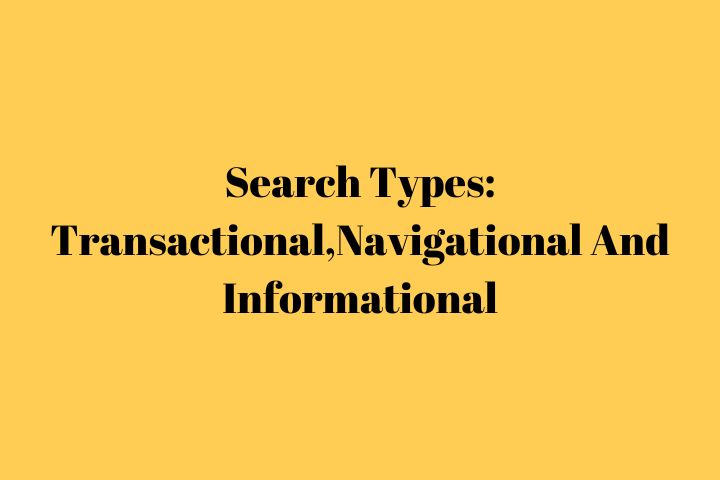Search Types: Transactional,Navigational And Informational

Search Types : Internet users often turn to search engines such as Google and Bing when they need help navigating the web and finding the websites, information, products or services they are looking for. To perform a search, the user enters a query in the corresponding box, and the search engine uses the entered query to present the most relevant links and information.
However, searches can be divided into several types, which differ from each other depending on the intention of the particular user. In general, there are three main types of search: transactional searches, navigational searches, and informational searches. Based on the query input and its syntax, the majority of current search engines are able to identify the type of search.
Table of Contents
Search Types: Detailed Summary
Search engines compete with each other to provide the best user experience, which means ensuring that you are offered the information you are looking for in the most convenient way. In the early days of the Internet, search engines were primarily engaged in providing links to web pages, and users were primarily engaged in finding pages that contained the information they wanted. But that’s not the case now.
Often, users of modern search engines are not searching for a web page, but rather looking for quick answers to a question or a product they can buy. Google, for example, provides featured snippets that offer what its algorithms believe is the best answer to a question, while searching for specific products often returns shopping links. However, to offer this type of experience to the user, the search engine has to try to determine the user’s intent.
To do this, search queries are usually divided into three main types, which are as follows:
- Transactional – A transactional search query indicates that the user is trying to complete a transaction, that is, purchase a product or pay for a service.”
- Navigational – A navigational search indicates that the user is searching for a particular website, company, or brand. Often, the Internet user has a clear idea of what he is looking for, but may not know how to get there without the search engine. Some examples are searches for “Textbroker”, “YouTube” or “BBC”.
- Informative – Finally, an informative search query indicates that the user expects to find information on a specific topic. This can be a search for advice, such as “how to make bread”, or more general information, such as “when was McDonald’s founded?” or “what is the capital of Brazil?”
The biggest challenge for search engines is determining which category a query fits into. Sometimes a search query will have a very apparent intent, like “buy Easter eggs,” which is obviously a transactional search. However, some queries can be much more ambiguous. For example, a search for “apple” can refer to both the fruit and the technology company, and could technically fit into any of the three categories.
It could be an informational search about the company or fruit, it could be a navigational search directed to the Apple Inc. website, or it could be a transactional search for the fruit or Apple products. The search engine’s algorithms will determine what the user’s most likely intent is, based on the format of the query, past user behavior, and any other information or data available.
Transactional Searches
Transactional searches are search queries that indicate a desire to complete a transaction or find transaction-related information. The transaction may be free, such as finding a file to download or a registration form to complete, but most often they are related to financial transactions, such as purchasing products or paying for access to services. Google calls these searches “Do” because they suggest an intention to perform an action.
A transactional search query can literally include a word like “buy” or “acquire” in it, or it can be more general. Likewise, you can include a broad description of a product category, such as “mobile phone,” or a more specific product, such as “iPhone.” To target transactional searches, website owners should use SEO
techniques on product pages. It can also be profitable to invest in sponsored ads and bid on relevant transactional keywords.
Navigation Searches
Browsing searches are performed when a user wants to visit a specific website. They may turn to a search engine if they are not sure of the correct URL to use, if they are not sure how to spell the name of a particular company or brand, or simply for convenience, especially if they have a search engine such as “home” page, or if your browser is set to perform a search automatically when you enter a query in the address bar. Google calls these searches “Go.”
In 2020, the five most popular queries on Google are examples of browsing searches: “Facebook,” “YouTube,” “Amazon,” “Gmail,” and “Google.” In all these cases, the user’s intention is most likely to find a link to the corresponding website. For website owners and marketers, there is no easy way to target browsing search users. Instead, they will need to develop brand recognition so that people want to find their website.
Informational Searches
An informational search is a “Know” query and aims to find information on a specific topic. These searches can take the form of a question, but they can also be generalized queries focused on a specific topic. With this in mind, “how to create a website”, “how to build a website” and “building a website” are examples of informational searches, as they are most likely to be entered when searching for information about creating a website. a website.
Google provides a snippet of information in response to many informational searches, and these results typically come from high-authority websites that have earned backlinks and provide useful information. Therefore, the best way to target informational search users is to create high-quality, useful content that people want to link to, and then use search engine optimization techniques within that content, in order to target to the most relevant keywords.
Conclusion
Search engines try to give users the best possible experience and one of the ways they have evolved to achieve this is by trying to automatically determine user intent. This causes most search queries to be classified into one of three main categories – transactional, navigational or informational – based on the search string itself, its format and the previous behavior of people who have performed a similar search. in the past.
Also read : Chegg Expert Login






